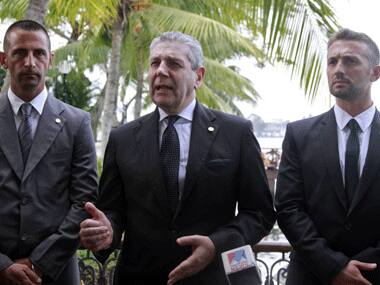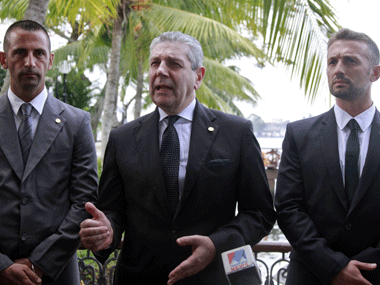New Delhi: India and Italy have found a face-saver through adept negotiations with the return of the marines but whether the families of the two dead Indian fishermen will get justice is open to question. The two Italian marines are unlikely to face real consequences when they return home and while in India, they will live in the plush environs of the Italian Embassy. India went ahead and assured Italy in writing that the two will not face a death sentence – an outcome which was highly unlikely to begin with given the nature of the alleged crime. [caption id=“attachment_674313” align=“alignleft” width=“380”]
 The marines with an Italian minister. File photo. Agencies.[/caption] Italy’s deputy foreign minister Steffan de Mistura, who accompanied the two marines on a military plane, has insisted that India has no jurisdiction over the marines because they are military personnel and Italy alone enjoys the privilege. He said they would serve time in an Italian jail. With all due respect, this doesn’t wash. It is time to jog the official Italian memory about a certain Abu Omar rendition case where the Italians argued just the opposite. Less than a year ago – on Sept. 19, 2012, to be precise – the Italian Supreme Court upheld convictions handed down by lower courts of 26 Americans, among them five US diplomats and a US Air Force colonel for the rendition (aka kidnapping) of Omar, an Egyptian cleric, from Milan in 2003. In the marathon trial process, Italian courts and the attendant establishment rewrote the rules of diplomatic immunity and set pesky new precedents. They argued the US had no jurisdiction. Parallels abound between the predicament of the two Italian marines, Ambassador Daniele Mancini and the fate those many US officers who found themselves in direct line of fire from Italian courts. They were tried and convicted in absentia for
Omar’s rendition
by CIA operatives as a suspect in the war on terror. Renditions were widely used by the CIA to whisk terror suspects from around the world and deliver them to countries of their origin to face the “music". Many were tortured while many others were wrongly identified in those hyper years following 9/11. The question here is not whether renditions were good or bad policy but of legal precedent and Italian arguments. Omar’s “extraordinary rendition” – a CIA euphemism – should ring a loud bell in the Italian foreign ministry. Italian courts denied diplomatic immunity for the five US diplomats. They also vehemently denied US jurisdiction over Lt. Col. Joseph Romano, now retired, in clear violation of the Status of Forces Agreement or SOFA, a bilateral pact between two NATO allies. The prosecutors argued that Romano would never spend jail time if returned to the United States. How Italy flagrantly violated the SOFA has been a subject of serious legal debate among American
legal scholars
. Italian courts argued that diplomatic immunity and SOFA did not apply to crimes such as kidnapping as they were not part of a diplomat’s normal duties. Italy was exceptionally agile in reminding India about its obligations under the Vienna Convention in the delicate matter of its envoy Daniele Mancini and diplomatic immunity. In fact, the note verbale from the Italian Embassy arrived on March 14, a full four days before the Supreme Court restricted him from leaving the country. During the trial of American officers in the Abu Omar case, the Italians argued the following: - That the Vienna Convention on diplomatic immunity did not apply to the five US diplomats since their actions – kidnapping or responsibility for planning the kidnapping – were not in keeping with their normal diplomatic duties. Mr. Mancini’s affidavit, it can be argued, was a ruse to allow the two marines to escape to Italy – an action certainly not in keeping with his normal diplomatic duties. - That even if not directly involved, the fact that a diplomat by virtue of his/her position “would have known or should have known” that a rendition was taking place and should have stopped it. Mr. Mancini, it can be similarly argued “would have known or should have known” that the marines were not coming back and should have acted to keep them in India. - That kidnapping is a grave crime and should not be covered by diplomatic immunity. In the case of the Italian marines, killing two innocent Indian fishermen is a graver crime. Mancini, of his own volition, gave an undertaking that they would return to India and became a party to the case. - The Italian prosecutor further argued that US diplomats and the air force colonel would never be held accountable in the United States because renditions, while violations of international law, are legal in the US. The trial, therefore, must proceed in Italy where the crime occurred. In the end, the crux of the Italian case was that the Vienna Convention did not apply given the enormity of the crime. Abu Omar was kidnapped by the CIA, flown to Egypt where he said he was tortured. He was released later for lack of evidence and he is alive. Ajesh Binki (25) and Gelastine (45), the two Indian fishermen, are not. By brazenly demanding and getting special dispensation for Massimiliano Latorre and Salvatore Girone, Italy has shown it argues from both sides of its mouth. And it does good political theatre.
The marines with an Italian minister. File photo. Agencies.[/caption] Italy’s deputy foreign minister Steffan de Mistura, who accompanied the two marines on a military plane, has insisted that India has no jurisdiction over the marines because they are military personnel and Italy alone enjoys the privilege. He said they would serve time in an Italian jail. With all due respect, this doesn’t wash. It is time to jog the official Italian memory about a certain Abu Omar rendition case where the Italians argued just the opposite. Less than a year ago – on Sept. 19, 2012, to be precise – the Italian Supreme Court upheld convictions handed down by lower courts of 26 Americans, among them five US diplomats and a US Air Force colonel for the rendition (aka kidnapping) of Omar, an Egyptian cleric, from Milan in 2003. In the marathon trial process, Italian courts and the attendant establishment rewrote the rules of diplomatic immunity and set pesky new precedents. They argued the US had no jurisdiction. Parallels abound between the predicament of the two Italian marines, Ambassador Daniele Mancini and the fate those many US officers who found themselves in direct line of fire from Italian courts. They were tried and convicted in absentia for
Omar’s rendition
by CIA operatives as a suspect in the war on terror. Renditions were widely used by the CIA to whisk terror suspects from around the world and deliver them to countries of their origin to face the “music". Many were tortured while many others were wrongly identified in those hyper years following 9/11. The question here is not whether renditions were good or bad policy but of legal precedent and Italian arguments. Omar’s “extraordinary rendition” – a CIA euphemism – should ring a loud bell in the Italian foreign ministry. Italian courts denied diplomatic immunity for the five US diplomats. They also vehemently denied US jurisdiction over Lt. Col. Joseph Romano, now retired, in clear violation of the Status of Forces Agreement or SOFA, a bilateral pact between two NATO allies. The prosecutors argued that Romano would never spend jail time if returned to the United States. How Italy flagrantly violated the SOFA has been a subject of serious legal debate among American
legal scholars
. Italian courts argued that diplomatic immunity and SOFA did not apply to crimes such as kidnapping as they were not part of a diplomat’s normal duties. Italy was exceptionally agile in reminding India about its obligations under the Vienna Convention in the delicate matter of its envoy Daniele Mancini and diplomatic immunity. In fact, the note verbale from the Italian Embassy arrived on March 14, a full four days before the Supreme Court restricted him from leaving the country. During the trial of American officers in the Abu Omar case, the Italians argued the following: - That the Vienna Convention on diplomatic immunity did not apply to the five US diplomats since their actions – kidnapping or responsibility for planning the kidnapping – were not in keeping with their normal diplomatic duties. Mr. Mancini’s affidavit, it can be argued, was a ruse to allow the two marines to escape to Italy – an action certainly not in keeping with his normal diplomatic duties. - That even if not directly involved, the fact that a diplomat by virtue of his/her position “would have known or should have known” that a rendition was taking place and should have stopped it. Mr. Mancini, it can be similarly argued “would have known or should have known” that the marines were not coming back and should have acted to keep them in India. - That kidnapping is a grave crime and should not be covered by diplomatic immunity. In the case of the Italian marines, killing two innocent Indian fishermen is a graver crime. Mancini, of his own volition, gave an undertaking that they would return to India and became a party to the case. - The Italian prosecutor further argued that US diplomats and the air force colonel would never be held accountable in the United States because renditions, while violations of international law, are legal in the US. The trial, therefore, must proceed in Italy where the crime occurred. In the end, the crux of the Italian case was that the Vienna Convention did not apply given the enormity of the crime. Abu Omar was kidnapped by the CIA, flown to Egypt where he said he was tortured. He was released later for lack of evidence and he is alive. Ajesh Binki (25) and Gelastine (45), the two Indian fishermen, are not. By brazenly demanding and getting special dispensation for Massimiliano Latorre and Salvatore Girone, Italy has shown it argues from both sides of its mouth. And it does good political theatre.
Seema Sirohi is a foreign policy analyst currently based in Washington. She has worked for The Telegraph (Calcutta), Outlook and Ananda Bazar Patrika in the past, reporting from Geneva, Rome, Bratislava, Belgrade, Paris, Islamabad and Washington on a range of issues. Author of Sita’s Curse: Stories of Dowry Victims, she has been a commentator on BBC, CNN and NPR.
)